Peter MALONE
Saturday, 18 September 2021 19:32
Look What's Happened to Rosemary's Baby

LOOK WHAT'S HAPPENED TO ROSEMARY'S BABY
US, 1977, 100 minutes, Colour.
Patty Duke, George Maharis, Broderick Crawford, Ruth Gordon, David Huffman, Tina Louise, Ray Milland.
Directed by Sam O'Steen.
Look What's Happened to Rosemary's Baby is a mild telemovie sequel to the original classic. Patty Duke takes Mia Farrow's place, George Maharis takes John Cassavetes' place. Ruth Gordon is here as Minnie Castavet, but Ray Milland is now her husband. The supporting cast includes Tina Louise and Donna Mills.
The film focuses on the young baby, Rosemary's abducting the child to take it away from the coven. It also focuses on Guy as a successful Hollywood actor and the coven asking him to give his dues. The coven is presented - but with Ruth Gordon's wacky style and Ray Milland's arch delivery, one wonders how seriously it is being presented. Steven McHattie? is Adrian, Rosemary's baby. He is destined to be the incarnation of Satan - but is being tested to be found worthy of such an evil presence. He fails, but the coven, ever ready, has a young woman to be the new mother of the satanic child.
The treatment is mild because of its being designed for television - paling beside such films as the Omen series. Direction is by Sam O'Steen, better known as a Hollywood editor.
1.Continuity with Rosemary's Baby? A sequel - or a postscript? Entertaining?
2.The locations, the desert, Hollywood, New York and the coven? A piece of Americana? The musical score?
3.The title and its tone? Audience expectations? Horror? Incarnation of the Devil?
4.The opening with the continuity and the original film, the cot, Rosemary and the baby, the coven? The ceremonies of the coven? Rosemary and her love for the baby, the child growing up, Rosemary protecting it? Wanting to take the child away from the coven? The escape, on the bus, at the roadside? Adrian and his brutality towards the children? Marjean and her overhearing the phone call from Rosemary to her husband? In league with him? Rosemary taken away in the empty bus?
5.Adrian growing up with Marjean, friendship with Simon Peter, racing around the countryside in the car, the difficulties with the sheriff? Friendship, Adrian wondering at his power? Wondering about his parents?
6.Adrian deciding to find out about himself? His godparents coming to see him? The driving, the death of Simon Peter and Adrian's anger and grief? His wanting to get away? The accident? The encounter with Ellen? Her looking after him at the motel? His becoming the victim of Ellen and the coven? His not being killed? His being left to wander - unworthy of the Devil's incarnation?
7.Minnie and Roman, their arch style, Devil-worshippers, the ceremonies and incantations? Their following? The links with Guy, trying to track down Rosemary? Their control over Adrian? Their discarding him and taking on Ellen and her baby? Miraculously healing her after the accident?
8.Marjean, the encounter with Rosemary and Adrian, her shrewd connection with Guy? Bringing Adrian up, trying to control him? Her prospering by her league with the coven?
9.Guy, the successful Hollywood actor, the price of being the foster father of the Devil's baby? The bargains with Ramon? Their pressure on him? Contact with his son, his death in the accident?
10.Ramon and Minnie, their influence, their control over Ellen, Ellen and her relationship with an Adrian, the seduction, the conception of the baby, the accident?
11.Peter Simon, his relationship with Adrian, theological college, friendship, his death?
12.Popular entertainment? Part of the popularity of diabolical films in the late '60s and into the '70s?
Published in Movie Reviews
Published in
Movie Reviews
Tagged under
Saturday, 18 September 2021 19:32
Looking for Jesus/ Cercasi Gesu
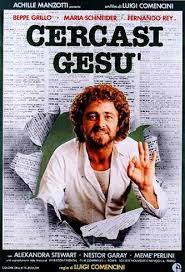
LOOKING FOR JESUS (CERCASI GESU)
Italy, 1982, 85 minutes, Colour.
Fernando Rey, Maria Schneider.
Directed by Luigi Comencini.
Looking for Jesus is a whimsical Italian comedy - with some serious undertones. It focuses on a young man emerging from an asylum, being picked up as a hitch-hiker by a `modern' priest, resembling Jesus and fulfilling all the marketing research for what an image of Jesus should look like in the contemporary world. He is put under contract for photographs illustrating a life of Jesus. However, he also acts in the manner of Jesus in encountering a range of people including a drug-addicted mother, a terrorist with a gun, her aristocratic family. He also interacts with the worldly committee who are promoting the life of Jesus. He is also given some witty lines in his critique of commercialism and personalities.
The film is quite enjoyable as a comedy, enjoyable in its look at a contemporary interpretation of Jesus present in the modern world. With the focus on the character emerging from an asylum and appearing as the Jesus-figure, it is very similar to Ben Lewin's episode's with Jeff Goldblum in The Favour, the Watch and the Very Big Fish (based on a French short story by Marcel Ayme).
1.Entertaining Italian comedy, whimsical, serious point about religion?
2.The Italian settings, Rome? The highway? Affluent homes? The musical score?
3.The plausibility of the plot? The official church people? The plans for the life of Jesus? Meeting the Jesus character?
4.The modern priest, on the road, hitch-hikers? Picking up Giovanni, Francesca? His bright idea, the audition and the photos? The identikit for the contemporary Jesus? The publication of the books? His persuasiveness with Giovanni? Controlling the press conference? Controlling the contracts and the money? Serious - with commercial worldliness?
5.Giovanni, in the asylum? On the road, getting a lift for Francesca? His pleasant manner, talking? The audition, his being photographed as Jesus - the make-up, the photo sessions? The million dollars? The press conference - and his not being able to speak? His growing cool on the idea? The group able to persuade him? His ability to read their characters? The woman with the baby, the drugs? Taking her home? Her sexual encounter with him? Francesca, the gun, going to see her mother and the family? Shooting the gun at the would-be arsonists? The discussions with the meeting, playing with the kids? Changing his mind? The happy ending - and his being taken to a different asylum?
6.The staff, the various types? The priests and the nuns, the modern plant, communication of religion? Money-making? Giovanni reading their characters? Their ploys, the meetings, press conferences, commercial? The US Presidential media kit? Giovanni's piano response to the press conference.
7.The world of problems, the girl with her baby, abandoning the child, using the money for drugs? Francesca, the gun, the set-up, for the murder of the professor? Her not being able to do it, the police coming to Giovanni, the interrogations?
8.The religious themes, the Gospel message, the commercialising of Jesus, the print media, photographs? Giovanni as living out the Gospel message of Jesus?
Published in Movie Reviews
Published in
Movie Reviews
Tagged under
Saturday, 18 September 2021 19:32
Long Walk Home, The
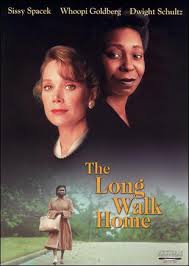
_THE LONG WALK HOME__
US, 1989, 95 minutes, Colour.
Whoopi Goldberg, Sissy Spacek, Dwight Schultz, Ving Rhames, Dylan Baker.
Directed by Richard Pearce.
The Long Walk Home is a moving film about a historical incident: the bus strike and integration of the buses in Montgomery, Alabama, in the mid-'50s. The film is a serious look at race relationships, a critique of the attitudes of the past, offering hope for bonds between black and white.
The film focuses on a wealthy family, with Sissy Spacek as the wife and mother, Dwight Schultz as the father. The women in Montgomery live an affluent life, busy about their social life and domestic life, not questioning and relying on their black servants. The black servants' work in the white homes, are treated as servants and beneath the whites. They go home to their own neighbourhoods. With the picketing of the buses, many of the servants had to walk to work - there were reactions in the city, meetings, violence and brutality. However, the buses were finally integrated.
Sissy Spacek is very good as the wife. However, the film belongs to Whoopi Goldberg who is at her dignified best as the middle-aged servant with her own family. Her performance is reminiscent of The Colour Purple and Clara's Heart, Corinna Corinna - rather than her comedy turns in such films as Ghost and Sister Act.
The film was directed by Richard Pearce, who has made a number of social-minded films, for example Heartland, as well as thrillers like No Mercy.
1.The impact of the film? For American audiences? Overseas audiences? How moving?
2.Montgomery and the state of Alabama in the '50s? The world of the affluent whites, their homes, social occasions? The world of the blacks, their homes, neighbourhood? The musical score? The use of songs, especially the religious songs sung by black Americans?
3.The historical basis, the truth of the film? The perspective of the '90s on the '50s? Able to assess and incorporate the drama of the changes? The importance of Martin Luther King, his presence in the background of the film? His arrest?
4.The voice-over and the daughter of the house reminiscing about her childhood, relationship with her family, with Odessa? Her assessment of the social change?
5.American racism, attitudes, language, behaviour, violence? White insecurity? Treatment of the servants? Rudeness - even at the Christmas dinner table? A portrait of southern society? A microcosm of the US of the past?
6.The title and its focus, the use of the buses in Montgomery, blacks and whites, the servants? Odessa and the buses? The boycott and her willingness to walk? Her daughter going on the bus, the attack by the white boys, sex and violence?
7.The picture of the family, affluence? Norman and his style? His brother? Discussions, prejudice? The growing anger at Miriam and her behaviour? The meetings, the ultimate violence, the anger and his defence of Miriam? His children? The children and their attitude to Odessa? Coming home for the holidays? The daughter and her changing attitudes? Miriam, her place in society, the background of her marriage, lifestyle, children? The food and meals? The servant and the cleaning of the house? Racist or not? Her working with Odessa? The impact of the boycott, on herself and the women playing cards? The decision to pick up Odessa? Driving past? The interaction of her own life with that of Odessa? The children, presence? The Christmas dinner and the rude comments of the family? Norm and his being pleasant to Odessa in the kitchen? The changes because of the boycott, Miriam talking more to Odessa, sharing her memories? Changing attitudes towards Norman? Going out, driving the black women? Taking the daughter and experiencing the violence, standing in line and making a stand against racism? Her transformation?
8.The portrait of American whites of the '50s, in the south, the tradition of slavery, their attitude towards black Americans - as less than human? The conversation at the Christmas table and the humiliation of Odessa?
9.Whoopi Goldberg as Odessa, screen dignity and presence? At home, with her family, the husband, the meals? At church and the joy of the ceremonies? The impact of Martin Luther King? At work, the contrast with her own home, care for Miriam's children, for Norm and Miriam? The boycott, her walking, the pain, her options? The lifts with Miriam? Christmas - and the gift of the dress? The Christmas dinner and the rudeness of the family? The bond with Miriam, sharing memories, the demonstrations, the violence?
10.Odessa's family, the portrait of her husband, the son and his experience of violence, the daughter harassed on the bus?
11.The church sequences, Martin Luther King, bomb scares?
12.The brother-in-law, his viciousness, the pressure on Norm and Miriam? The meeting, the pickets, the whites and their viciousness? The black women and their singing? Stances taken and made?
13.A portrait of people in a time? Understanding the period and the issues through the story? The consequences in Alabama, for American society in general?
Published in Movie Reviews
Published in
Movie Reviews
Tagged under
Saturday, 18 September 2021 19:32
Long Silence, The
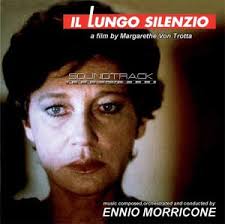
THE LONG SILENCE
Italy/Canada, 1993, 100 minutes, Colour.
Carla Gravina, Alida Valli, Paolo Graziosi, Ottavia Piccoli, Jacques Perrin.
Directed by Margarethe Von Trotta.
The Long Silence is an Italian- Canadian co-production, written and directed by Margarethe von Trotta, the German writer-director of such films as Sisters, The Lost Honour of Katherina Blum, Rosa Luxembourg. It is a film of Italy in the '90s, social and political questions. It is a film about government, corruption, investigations - with themes of integrity as well as the futility of individuals going against organised crime, especially the Mafia.
The film won the Ecumenical Award at the 1993 Montreal Film Festival. Italian actress Carla Gravina also won the Best Actress award. The film is serious, sombre and powerful.
1.A portrait of Italy in the '90s, fiction and reality? The political history of Italy in the '90s, changes of government, attacks on the Mafia, the Mafia fightback?
2.The quality of the screenplay, the perspectives of Margarethe von Trotta? The contribution of Carla Gravina, the strength of her performance? Her perspective and the ending? The final collage and the witnesses declaring themselves?
3.The title and its comment on the Italian experience, the domination of corruption, people keeping quiet, the women and their long silence, the breaking of the silence?
4.The dramatic impact of the opening and the revelation? The humanity of the film - in the context of the story, Italy, politics? The ending of the film - a sense of failure and pessimism? Or self-assertion and hope?
5.Marco and Carla, together, the gradual revelation about them, their work, their relationship? Integrity, the phone calls, the return, security? With each other, alone? The dramatic impact of the threats? The fears?
6.The situation and the deals, the government, corruption, investigation, security? The witnesses and the interviews?
7.Marco and Francesco, the man in command? Care and caution?
8.Carla, the doctor and Maria, the mother and the art? Alone, the cinema? Rosa? Her personal strength, her fear? The phone calls, the candles? The strength of her decision? Its effect?
9.The night out, the farewell, the television information? The funeral - and her not shaking hands? The reading of the will?
10.Carla with her mother, the relationship, the arguments?
11.The doctors, those in charge? The reporters? Ripa and the interviews? The wife as witness? The testimony, the paper?
12.The dramatic build-up of the threats, the rain, night, death?
13.The importance of the voices, the breaking of the silence? Maria?
14.Themes of integrity, characters of integrity: Francesco, Maria, Rosa, the man in charge?
15.The suspense of the drama? The reality of the danger in Italy in the '90s? The finale with the voices? Integrity - futility or hope?
Published in Movie Reviews
Published in
Movie Reviews
Tagged under
Saturday, 18 September 2021 19:32
Long Live the Lady
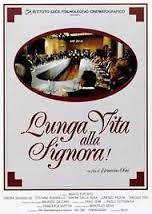
LONG LIVE THE LADY
Italy, 1986, 107 minutes, Colour.
Marco Esposito, Simona Brandalise.
Directed be Ermanno Olmi.
Long Live the Lady is a film written and directed by Ermano Olmi - and made for Italian television but getting some theatrical release around the world. Olmi is best known for him films Il Posto, The Tree of Wooden Clogs, The Legend of the Holy Drinker.
The film has echoes of the exterminating angel, even Fellini's Satyricon with its almost total focus on a banquet. The film shows a group of young people going to a mountain resort and being trained to serve at a huge and lavish banquet. The film also shows the elitist guests and the eccentric elderly woman who is their hostess. The film highlights the meticulous training, the details of the meal - and offers the audience a chance to make allegorical interpretations about human nature, class distinctions. There is an enigmatic ending as the young hero, one of the waiters whom Ermano Olmi seems to identify with, running away from the hotel, pursued by a St Bernard dog and terrified but realising that the dog wanted only to play.
Enigmatic, a mood piece, meticulously edited for leading the audience into the atmosphere with touches of the comic as well as touches of menace.
1.Interesting? Entertaining? Impact of the drama? A fable, parable or allegory?
2.The work of Ermano Olmi in Italian cinema? Serious themes? Demands on audiences for reflection? His point of view on Italian society, class distinctions? Seeing the banquet and the training from Libenzio and his point of view?
3.The metaphor of the banquet, a microcosm, an image of Italian society?
4.The visuals of the hotel, the mountain countryside, its antiquity? The hall, the rooms for the staff, the banquet hall, the kitchen, the cellars? The permanent staff and their elitism? The film's attention to training detail, the setting of the tables, the cooking, the huge fish? The manager and her putting place-names at the table? All in readiness for the guests? The reception of the guests?
5.The youngsters and their arrival by train, the summer job, their bewilderment, in the old van, arrival at the hotel, getting their rooms, being regimented, the speeches and morale? Their clothes, attention to detail of the training, crockery and cutlery, etc? The film's use of close-ups and wordless expressions? Any characterisation of the staff?
6.The staff trainers, methods?
7.Libenzio and the film's focus on him, his arrival, one of the group? His memories, the relationship with his father as a young child, at home, seeing the young girl at the banquet and his memory of angels, questions about angels and their looking feminine, reaching up to the picture of the angel? The humour of his name and the teacher explaining it in connection with libations? Shyness, at attention, losing the cigarette lighter, going down to the cellar, his curiosity? Looking at the hostess? The young girl and the attraction? His father's visit and their talk, getting back inside? The effect of the evening, the lady being carried out on the stretcher, the decision to run away, being pursued by the dog, terror, lying on the grass - and the final caption with the dog wanting to play with him?
8.The lady, her age, tyrannical presence, elitist? Her binoculars looking at the guests and their behaviour? The guests themselves, their rank, professional background? Waiting for the lady, conforming? The woman who stole the cigarette lighter? The woman concerned about the baby - and the people in clowns' clothes? The rebellious guest and his scorning the lady? The servant made to fill the extra place, needing his glasses? Their reaction to the food - liking, disliking? The entry of the fish and its being cut up for the guests? The desserts and their applause? The video presentation, the man wanting to make a speech but being drowned out by the musicians? The suggestions of the significance of the banquet, the reasons for the guests' presence etc? The lady and her departure?
9.The lady, her collapse, being carried out of the hotel?
10.The behaviour of the guests after being set free from the dining room, playing cards, more relaxed?
11.The effect of sharing this banquet with the staff and the guests? Comment on human nature?
Published in Movie Reviews
Published in
Movie Reviews
Tagged under
Saturday, 18 September 2021 19:32
Long Journey Home, The
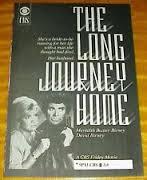
THE LONG JOURNEY HOME
US, 1987, 88 minutes, Colour.
Meredith Baxter, David Birney, Mike Preston.
Directed by Rod Holcomb.
The Long Journey Home is a melodramatic telemovie, a crime thriller with the background of the Vietnam War and prisoners missing in action. It was co-produced by the husband and wife team, the stars, Meredith Baxter and David Birney.
The film highlights the impact of the Vietnam War, the prisoners missing in action, the need for groups of wives with memories of their missing husbands. It has echoes of search and recover expeditions into Laos. It also has overtones of corruption, drug dealing and crime amongst operatives. It is also sinister in its presentation of government undercover agencies.
The film is highly emotional, focusing on Meredith Baxter Birney's character, her being reunited with her husband in his danger, his falling in love again with her, her realisation that time had passed and that the past could not be recovered. An entertaining, time-passing thriller.
1.Interesting telemovie? Crime thriller? The Vietnam War background? A piece of Americana? Designed for the wide popular television audience?
2.The American cities, big business, affluent families? The contrast with the background of the '60s and '70s, campus revolutionaries? Soldiers in action, prisoners of war, the men missing in action? The background of government agencies, undercover espionage? Crime?
3.The title, the reference to Maura and her experience, to Carter?
4.Maura, with her group, their support, the plan to marry? Her memories of Carter, falling in love, protests, he being the professor, the reaction of her wealthy family? No children? The photo albums? Her being in love with Gray, the relationship, the plan to marry? Her going to Los Angeles for business? The gift from Gray? The phone call from the lawyer? Her going to the airport, the encounter with Carter, her disbelief? The physical danger, Mota and his dangerous pursuit? Car chases, the story from Carter? Her trying to deal with the situation? Going with him, the airport, on the plane, getting off, the explosion? Hiding out - but falling in love again with Carter? Her bewilderment because of Gray, wanting to contact him, going to the funeral ceremony, the dog, letting it loose? Her being unsure of Carter? In the city, the possibilities of getting new passports? Walking on the beach, sharing memories? Assessing the past? Her regrets? The continued dangers? Her decision to go with him? Giving him the photo for the passport? Seeing Mota, Carter in danger? The pursuit? Her return home, Gray and his reaction, her business partner? The truth about the money? Carter's return, Mota, the shooting? The truth? Her disillusionment? Carter going over the cliff with Mota to save Maura? Her going to the passport-makers and finding that he had got a passport for her? Her bewildering emotional journey, being used by the lawyer, his death? Her having to let go of the past?
5.Carter, the professor, protests? Love for Maura, the marriage? Service, missing in action? His escape - and not letting Maura know? Double agent? Mota as a double agent, drugs and money, the killing, Mota pursuing him? The plan to get Maura's money, seeing her again, the danger? Sharing, falling in love, the passports? The danger? Mota catching up with him? The shots, his return to Maura, the taking of the money, the declaration of love, gunpoint on the cliff, his destroying Mota and saving Maura?
6.Mota, background in Vietnam, his killing the lawyer, pursuing Carter, the explosion of the plane, following the clues, the cigarette packets, the shop? The funeral? Catching up, the confrontation and his death?
7.Gray, businessman, relationship with Maura, the planned marriage, the gift? The police and their suspicions of him? The interviews? The funeral, her return, his attitude - a possible future with Maura?
8.The business associates, Marsh and his plans, the fake suicide? The elderly business adviser? The secretaries, the interviews with the police?
9.The police? Personalities, suspicions, interviews?
10.The melodramatic story and its plausibility? Characters, behaviour, interactions? Love, grieving, marriage and remarriage? Undercover agencies? Criminal activity? Vengeance?
Published in Movie Reviews
Published in
Movie Reviews
Tagged under
Saturday, 18 September 2021 19:32
Long Gone
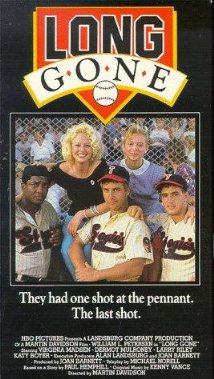
LONG GONE
US, 1987, 113 minutes, Colour.
William L.Peterson, Henry Gibson, Virginia Madsen, Dermot Mulroney.
Directed by Martin Davidson.
Long Gone is a telemovie made for Home Box Office. It capitalises on Americans' love for baseball, Set in the late '50s in Florida, it shows a small local team and their lack of success, their being coached to victory, the threat to their winning the pennant by the greedy owners of another club.
While the material is familiar, it is done with some verve and genial tone. William L. Peterson (To Live and Die in L.A., Manhunter, Cousins) is effective as the coach who enjoys winning, has a macho philosophy of life, is faced with a personal and conscience crisis. Virginia Madsen (Electric Dreams, Third Degree Burn, Gotham) is the southern girl who helps Peterson make a stand. The supporting cast includes Henry Gibson as the owner of the team and Dermot Mulrooney (Blue Iguana, Young Guns) as a star player.
The film echoes the atmosphere of the times, shows us the intricacies of baseball - and finally shows us a stance for personal integrity and personal relationships - with a final baseball American flourish. Direction is by Martin Davidson (The Lords of Flatbush, Boardwalk).
1.Enjoyable baseball film? The '50s? Re-creating the atmosphere of the times? Of the perennial traditions of baseball?
2.The Florida settings, the atmosphere of the '50s? The team, the baseball sequences? Musical score?
3.The title, nostalgia - and the reference to the characters and the issues?
4.American love of baseball? Its part of the American tradition, integrity and dishonesty? Money, the owners? The players and their dedication, possibilities of temptation? The fans? The need for integrity?
5.Stud Cantrell and his reputation, his past, personality, the meeting with Dixie, his relationship with her? Coaching the team, their failures? The owner and his son and their comic style? Building up the team, the enjoyment of the victories? Relationship with Jamie and Brown and their success? His macho philosophy? His friend taking him to see the owners of the rival team, their proposition and condition, his accepting? Dixie's reaction and walking out? Brown and his bribe? Jamie and his disgust? Listening to the match, with Brown, bashing Brown's bribe car, the return, playing with integrity, reunited with Dixie? Even the owner's enjoying the victory, the fans? The new philosophy of life? The wedding?
6.Dixie, from the south, loud style? Meeting Stud, relationship with him? Supporting him? Her disappointment at his choice, her decision to leave him? The story of her father, of her life? Her enjoying his change of heart? The wedding?
7.The owner and his son, their working together? The comic style? Bribed? Worried? Enjoying the victory? The contrast with the owners of the opposition, their smug presumption, bribing Brown, the proposition for Cantrell? Their watching the match, directing the coach, the coach's disgust, their losing?
8.Jamie, his skills, listening to Stud? Friendship with Esther, the tenderness between them, the news of her pregnancy, his harsh reaction, her going to Mobile? Dixie's attack on him? His disappointment about Cantrell's stand? Trying to rally the team? The match, the success? Stud's new philosophy? Going to Mobile? The wedding?
9.Brown, the black player in those times? The pressure on him, his skill? Being bribed, staying away? His disgust, bashing the car? His skill in the game?
10.The players, the joy of playing, the team, the victories? The opposition and their exasperation?
11.Well-drawn characters? The touch of sentiment and humour? Themes of integrity? American sport and the baseball traditions?
Published in Movie Reviews
Published in
Movie Reviews
Tagged under
Saturday, 18 September 2021 19:32
Lone Star
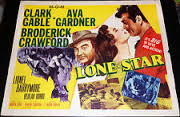
LONE STAR
US, 1952, 90 minutes, Black and white.
Clark Gable, Ava Gardner, Lionel Barrymore, Broderick Crawford, Ed Begley, Beulah Bondi, Lowell Gilmore, Moroni Olsen, Russell Simpson, William Conrad.
Directed by Vincent Sherman.
Lone Star is a Texas story. It focuses on the question of Texas belonging to the United States or being an independent republic. There is a focus on Andrew Jackson (Lionel Barrymore) and his efforts to persuade the famous Sam Houston to endorse annexation.
While the film has a western setting, it is something of a political drama - however, there are scenes with the Apaches as well as a brawl outside the congress in Austin.
Clark Gable is strong in the central role. Ava Gardner is a newspaper publisher in Houston. The supporting cast includes Broderick Crawford as the man against annexation, Beulah Bondi and Ed Begley. Direction is by Vincent Sherman, better known as a director of dramas and romances at Warner Bros during the '40s.
1.Interesting piece of Americana? History of Texas? The West?
2.MGM production, black and white photography, the Texas settings? Score? Stars?
3.The title, the focus on Texas, its history, part of the United States?
4.The political background? The republic of Texas and its president, congress, senators? The move to annexation? The relationship with Mexico? Andrew Jackson and his presidency, his concerns?
5.Dev and his working for Jackson, travelling to Texas? False name? The encounter with Tom Craden? The Indians? With Martha? The loyalties and disloyalties in Austin? The clash with Tom Craden? Getting the senators out of his house? In love with Martha, clashes with her? The visit to Houston, the Indians, the pursuit by Craden? Going to the governor, the letter and its ink flowing? His seeming defeat? Martha supporting him in the paper? The clash with Craden? The siege outside the congress house? The personal fight with Craden? Victory, Houston's arrival? The riding south to Mexico? Western hero?
6.Tom Craden, his stances and ambitions, meeting Dev, deceived by him, hospitality and the dinner, holding the senators in his house? The pursuit of Dev, hearing Houston's words, confirming them to Martha? His clash with Dev, the fight, changing his heart and going to Mexico?
7.Martha, running the paper, her relationship with Craden? At the dinner? Hospitality, avoiding politics? The power of her paper? In love with Dev? Disgusted with him, the influence with the governor? Her printing the true story? With Minerva, the fight, the vindication?
8.Minerva, friendship with Dev, concern about him, with Martha, at the finale? Some humour?
9.Sam Houston, his reputation, treaties with the Indians, his roundabout diplomacy? Supporting annexation?
10.The senators and the congress of Texas? Their stances, political divisions? Military? Threats of war? Kept by Craden? The session in the congress with the siege outside?
11.The picture of the West? The history of Texas?
Published in Movie Reviews
Published in
Movie Reviews
Tagged under
Saturday, 18 September 2021 19:32
Lonely Passion of Judith Hearne, The

THE LONELY PASSION OF JUDITH HEARNE
UK, 1987, 116 minutes, Colour.
Maggie Smith, Bob Hoskins, Wendy Hiller, Marie Kean, Ian Mc Neice, Prunella Scales.
Directed by Jack Clayton.
A masterly portrait of a repressed Irish spinster of the 1950s. Maggie Smith offers one of her finest performances as the ladylike Judith, who has cared for her wilful aunt (Wendy Hiller in a grande dame role) and tries to teach music, but loses students through unreliability and secret drinking. She tries to sustain her faith and piety but experiences the hardness of Irish Catholicism, and collapses. Bob Hoskins gives a quietly effective performance as the object of her hopes and affections. Marie Keene embodies the manipulative mother and sister as the landlady.
Brian Moore's novel has been adapted well by Peter Nelson and directed perceptively by Jack Clayton (Room at the Top, The Innocents, The Great Gatsby). It is unhurried but intensely real and passionate as Judith Hearne suffers and survives. It is Maggie Smith at her best, intense and moving.
1.The impact of the drama? Quality of performance? Portrait of a woman, of Ireland, of the Catholic church?
2.The writings of Brian Moore, his portrait of Judith Hearne, sympathies, compassion? The quality of the adaptation? The perceptiveness of Jack Clayton?
3.The Irish settings, Dublin, the city, homes, institutions, the church? The 1950s, authentic? The atmospheric score?
4.The tone of the film, its pace? Judith and her experiences, memories, influences, her ability and inability to cope, her breakdown, her future?
5.The prologue with the young girl in the church, devout, her aunt, the hiccups, laughing and the other girls laughing, the severity of her aunt, squeezing her hand tightly? Symbol of what was to follow?
6.The flashbacks of Aunt (and Judith keeping her photo, talking of her)? Judith playing the piano and Aunt's delight, the elegant soirees and guests, her collapse, the passing of the years, her tantrums, wanting sweets, the possibility of her going to an institution, appealing to Judith for having taken her in as an orphan? The effect of her experience with her aunt, growing up, talent, experience of love and devotion, repression?
7.The quality of Maggie Smith's performance: her appearance, manner, speech, dress? Her arrival, seeing the room, Mrs Rice's reaction? The picture of the Sacred Heart, of her aunt, a sign of settling? Talking? Her losing the pupil and the harsh reaction of the mother? The audience wondering about her? Sympathetic to her ladylike style? Seeming a victim? The meals in the boarding house, her being late and reprimanded? Her interaction with the guests? With Mary? With Bernie? Being introduced to Jim?
8.At home in the boarding house, her interest in Jim, listening to his stories, going to the pictures, Samson and Delilah with its sexual overtones, and the advertisement? Going to Mass? The dinner, the talk about the business and the fast foods? Sharing with him? The return home, Mrs Rice offering a cup of tea, her getting rid of Jim while Judith made the tea? Judith's hurt, drinking to console herself, yet another, singing, collapsing on the floor, keeping people awake? Her being awakened, losing another pupil, the humiliation on the phone? The anger of the guests about her drinking and singing? Mrs Rice's reaction? Judith's quiet desperation, going to visit Moira and her friends, telling the stories, playing the piano and not being able to continue, the children avoiding her sometimes, listening to her? Her drinking and taking more? Drinking with Moira? The memories of drinking with Edie? Mrs Rice and her severity, Bernie and his telling lies about Jim to get rid of her? Her going to confession and pushing in before the children, the harshness of the priest? Her being ousted, going to the swank hotel, the taxi and keeping it waiting, her reliance on religion, the Sacred Heart and her prayer, going to see Edie in the institution, talking, drinking, being ousted? Going to the priest, her plea, her being drunk, the priest not answering about belief in God, her desperately going into the church, banging on the tabernacle? To the hospital, her suffering and passion, calm, treatment, the relationship with the nuns? Jim coming to see her, her refusal and change of mind, the walk, his talk once again about money? His giving her an address? Her leaving, throwing away the address? Her collapse and her rising? Passion and resurrection?
9.The significance of Judith's passion: loneliness, love, sexuality and repression, drinking? Crucified, abandoned, rising again?
10.The portrait of Jim, his American background, 30 years? The return to Ireland? With his sister, at meals? Attracted to Judy, going out, the film, talking, attentive? The meal, the business discussion, his misinterpreting her? The clash, the going to Mass - and the truth about the money? The influence of his sister, going away? His reaction to Bernie and Mary? His severity, his going into Mary's room, the rape, his trying to talk it down? His return to the house? His coming to the hospital, his further misapprehension about Judith and her money? The mixture of affection and ambition? Giving her the address?
11.Bernie, the pampered Irish son? Eating continuously? His mother? The relationship with Mary, sexuality, Jim's reaction? His attacking Judith to get rid of her? His lies?
12.Mary, the maid, the convent background, her surliness, service, her sexual relationship with Bernie, the attack by Jim? Her reaction to this?
13.The portrait of Mrs Rice, her manipulative nature, her pampering her son, giving him food, making rules, being demanding, controlling Jim's life, the cup of tea after the outing, getting rid of Jim? Wanting Judith out of the house? Her smug Catholic self-righteousness?
14.The sequences with the priest, in confession, his growling about her interrupting the children, his lack of sympathetic understanding, his avoiding the issues? Her visiting him in the presbytery, his desperation, his not answering the question about belief in God? His belated attempts to be helpful?
15.Moira and her family, pleasant, the children avoiding Judith, Moira and her husband welcoming her, the drinks, paying for her hospital room, Moira and her charity in listening to Judith say that she never liked her?
16.Edie, the past friendship, the beginnings of drinking, illness in the hospital, sharing, her being ousted? The reaction of the nuns in the hospital - friendly, nunnish?
17.The Irish background, the tight tradition, Irish manners and reticence, suppression of feelings, repression of sexuality, angers?
18.The portrait of the Catholic Church at the time, devotion and piety, rules, Mass and Communion, prayers? The role of the priest, authority, confession? The impersonal harshness of the church? Judith's anger?
19.The film taking the audience into the world of its time? Sharing the experiences with the characters? The portrait of Judith?
Published in Movie Reviews
Published in
Movie Reviews
Tagged under
Saturday, 18 September 2021 19:32
Neil Simon's London Suite
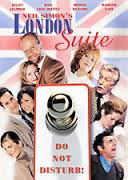
NEIL SIMON'S LONDON SUITE
US, 1996, 100 minutes, Colour.
Kelsey Grammar, Julia Louis Dreyfuss, Michael Richards, Jane Carr, Julie Haggerty, Patricia Clarkson, Paxton Whitehead, Madeline Kahn, Richard Mulligan.
Directed by Jay Sandrich.
Neil Simon's London Suite is a telemovie - with echoes of his previous portmanteau plays and films, Plaza Suite and California Suite.
This film is particularly American despite its London locations, especially at the Grosvenor Hotel. The film relies on Neil Simon's wit - a bit obvious here though always amusing. It also relies on the performances, although Julia Louis Dreyfus seems over-frenetic as the wife who thinks her husband has left her. Also from Seinfeld is Michael Richards, who mugs as the punter from America whose back goes on him. Madeleine Kahn is her usual self as a mother on a shopping spree. Richard Mulligan also mugs with a false Irish accent. This leaves Julie Hegarty to be one of the more calm members of the cast. The best story involves an actress (Patricia Clarkson) and her meeting with her former husband who has acknowledged that he is gay. Kelsey Grammer gives a very persuasive and sympathetic performance in this role. (It is reminiscent of the Maggie Smith- Michael Caine episode in California Suite.) The film was directed by Jay Sandrich, who has directed a number of versions of Neil Simon, for instance Seems Like Old Times.
1.The popularity of Neil Simon as playwright, and the adaptations of his plays for big screen and small screen? Expectations of his style, characters, humour and wit?
2.The popularity of the portmanteau film - the four stories interweaving, the setting of the Grosvenor Hotel?
3.The Grosvenor Hotel itself and its appearance, affluence? The atmosphere of London? The exteriors and interiors? The musical score?
4.The life of the hotel - especially as focused on the manager and his coping with the crises? The bellboys and their help? The manager and the doctor?
5.The nervous wife, her desperate arrival, the story of her having been married, the story of the drinking and festivities on the plane? Her telling the truth to her husband? The sympathetic ear of the manager and his helping her? Her waiting, anxiety, the phone calls? Going to her room? The arrival of the brother-in-law and his wife, the build-up to the party? Her mad excuses about the illness of her husband? His sudden arrival, the diplomacy of the manager? The story of his arrest, the happy reunion?
6.The couple going to Wimbledon, their arrival at the airport, the husband and his back going out, his complaints, showing off with the luggage and lifting it? The taxi in traffic and the sardonic remarks of the driver and their inability to understand his English? Arrival at the hotel, critique, the room, the collapse? His agony and lying on the floor? The wife and the search for the tickets, going downstairs? The doctor, the manager trying to help? The bellboy and his being unconscious? The happy resolution?
7.The actress returning to England, her television career? Grace and her devotion? Anticipating her husband's arrival? The separation of eight years, the background of his coming out and his living in Greece with his lover? The anticipation of his arrival? His pleasant manner towards Grace, understanding her devotion? The reunion, the discussions, the wit, sparring off each other? His story of his friend's illness, wanting the money? The realisation that the story was about him? Their having the meal together, the question of the money, her persuading him to go to the US for treatment?
8.The mother and her shopping spree, the help of the daughter, buying her own shoes? Getting her hair done? The odd Irishman and his snorting, accent? The going out, the preparation for the outing, his courting her?
9.A cross-section of American tourists in London? Audiences identifying with the characters, the situations, the humour?
Published in Movie Reviews
Published in
Movie Reviews
Tagged under